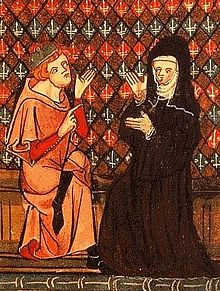
Back Petrus Abaelardus Afrikaans بيار أبيلار Arabic بيار ابيلار ARZ পীয়েৰ এবেলাৰ্ড Assamese Pedro Abelardo AST Pyer Abelyar Azerbaijani П’ер Абеляр Byelorussian Пиер Абелар Bulgarian পিটার এবেলার্ড Bengali/Bangla Pierre Abélard Breton
Peter Abelard | |
|---|---|
 Abelard and Heloise | |
| Born | c. 1079 |
| Died | 21 April 1142 (aged 62–63) Abbey of Saint-Marcel near Chalon-sur-Saône, France |
| Notable work | Sic et Non |
| Era | Medieval philosophy |
| Region | Western philosophy |
| School | Scholasticism Peripatetic Conceptualism |
Main interests | Metaphysics, logic, philosophy of language, theology |
Notable ideas | Conceptualism, limbo, moral influence theory of atonement[1][2] |
Peter Abelard (/ˈæbəlɑːrd/; French: Pierre Abélard; Latin: Petrus Abaelardus or Abailardus; c. 1079 – 21 April 1142) was a medieval French scholastic philosopher, leading logician, theologian, poet, composer and musician.[3]
In philosophy, he is celebrated for his logical solution to the problem of universals via nominalism and conceptualism and his pioneering of intent in ethics.[4] Often referred to as the "Descartes of the twelfth century", he is considered a forerunner of Rousseau, Kant, and Spinoza.[5] He is sometimes credited as a chief forerunner of modern empiricism.[6]
In history and popular culture, he is best known for his passionate and tragic love affair, and intense philosophical exchange, with his brilliant student and eventual wife, Héloïse d'Argenteuil. He was a defender of women and of their education. After having sent Héloïse to a convent in Brittany to protect her from her abusive uncle who did not want her to pursue this forbidden love, he was castrated by men sent by the uncle. Still considering herself as his spouse even though both retired to monasteries after this event, Héloïse publicly defended him when his doctrine was condemned by Pope Innocent II and Abelard considered a heretic. Among these opinions, Abelard professed the innocence of a woman who commits a sin out of love.[7]
In Catholic theology, he is best known for his development of the concept of limbo, and his introduction of the moral influence theory of atonement. He is considered (alongside Augustine of Hippo) to be the most significant forerunner of the modern self-reflective autobiographer. He paved the way and set the tone for later epistolary novels and celebrity tell-alls with his publicly distributed letter, The History of My Calamities, and public correspondence.
In law, Abelard stressed that, because the subjective intention determines the moral value of human action, the legal consequence of an action is related to the person who commits it and not merely to the action. With this doctrine, Abelard created in the Middle Ages the idea of the individual subject central to modern law. This eventually gave to School of Notre-Dame de Paris (later the University of Paris) a recognition for its expertise in the area of Law (and later led to the creation of a Faculty of Law of Paris).
- ^ Weaver, J. Denny (2001), The Nonviolent Atonement, Wm. B. Eerdmans Publishing
- ^ Beilby, James K.; Eddy, Paul R. (2009), The Nature of the Atonement: Four Views, InterVarsity Press
- ^ Peter King, Andrew Arlig (2018). "Peter Abelard". Stanford Encyclopedia of Philosophy. Center for the Study of Language and Information (CSLI), Stanford University. Archived from the original on 14 May 2008. Retrieved 10 October 2019. This source has a detailed description of his philosophical work.
- ^ Marenbon, John (1997). The Philosophy of Peter Abelard. Cambridge University Press. ISBN 978-0-521-66399-1.
- ^ Menasse, Robert (22 March 2018). "Enlightenment as a Harmonious Strategy". Versopolis. Archived from the original on 1 April 2018. Retrieved 31 March 2018.
- ^ Gans, Eric. Abelard and Heloise. http://anthropoetics.ucla.edu/views/vw13/ Archived 2 December 2021 at the Wayback Machine
- ^ E. Gilson, La morale de l'amour pur, in Abélard et Héloïse, éd. E. Bouyé, Correspondance, p. 30–31, Folio Gallimard, Paris.
© MMXXIII Rich X Search. We shall prevail. All rights reserved. Rich X Search